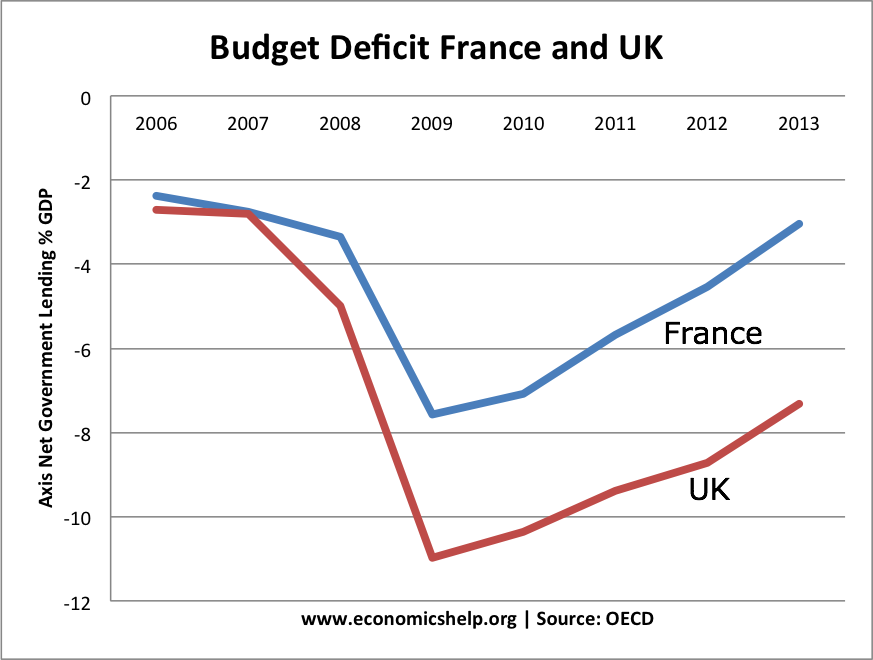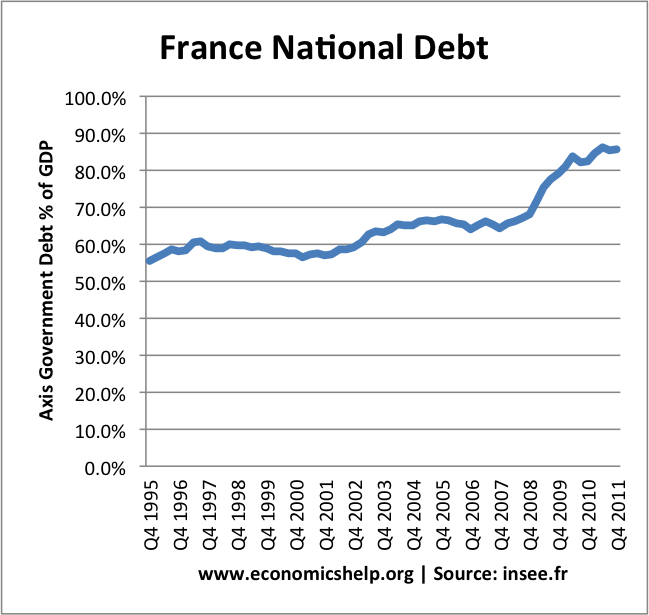When President Holland was elected in the summer, he suggested that Europe would turn against austerity and promote economic recovery as the most important objective. However, despite his early promises, the French budget is strongly deflationary. Given the state of the current French and Eurozone economy, this budget is likely to push France into prolonged recession and increase the unemployment rate (already above 10%)

Despite earlier criticising austerity, France has embraced the target of cutting the public deficit to 3% of GDP, from a forecast 4.5 % this year.
To do this, the government last week unveiled 20 billion euros in tax rises and a further 10 billion in spending cuts. This is country’s toughest budget in 30 years.
- Tax rises include an increase in the top marginal income-tax rate to 45% from 41%
- There is also a new special tax on incomes above €1 million ($1.3 million) at an overall rate of 75%.
- The richest will pay on average €140,000 more in taxes next year, the government said.
- By increasing taxes on the rich, the Socialist government have hoped it will be easier to be accepted by the rest of the population.

Will this budget (deflationary fiscal policy) in a recession help reduce long-term debt and solve France’s competitiveness problem?
France Unemployment
French economic growth is forecast to be 0.1% for 2012. Growth in the last quarter was -0.2% (economist data)
Issues arising from the French budget
- France has already one of the highest tax rates in the developed world. Business leaders have threatened to leave the country in protest at 75% marginal tax rates.
- It may be noble to try and spread the ‘pain’ of the credit crunch. But, if 75% tax rates do cause people to move elsewhere, the tax revenue raised may be much less than expected.
- France has one of the longest rates of retirement in the developed world. Just 39.7% of those aged 55 to 64 are in work – compared with 56.7pc in the UK and 57.7pc in Germany [1]. Earlier this year, President Holland actually reduced the pension age for public sector workers to 60. With an ageing population and long-term budget deficit, increasing the retirement age would help productivity and reduce the long-term deficit – without adversely affecting economic growth. However, the budget has little to deal with long-term issues of falling competitiveness, poor productivity growth and an ageing population
- Evidence from southern Europe, suggests deflationary fiscal policy during a recession fails to reduce the Debt to GDP ratio. Deflationary fiscal policy (combined with declining exports) leads to lower growth and lower tax revenues. With shrinking GDP, tax rises are unlikely to alter the long-term debt structure.
- Why is Europe sticking to deficit reduction targets during a recession? The goal of 3% budget deficit does not make sense. (growth and stupidity pact back in 2009)
- The sad thing is that this budget imposes a lot of economic pain ‘higher taxes’ and lower growth, but, it is unlikely to reassure bond markets. Bond markets should want two things.
- economic growth and falling unemployment in the short term.
- Structural change in long-term (e.g. controlling growth in public sector spending, e.g. pensions and healthcare)
But, this budget will do neither.
related

So French voters actually believed Holland when he said he’d end austerity? Hilarious. Joke of the century. And there was me thinking the British were dumb.
Let me remind you that Holland won with 51,62 %…